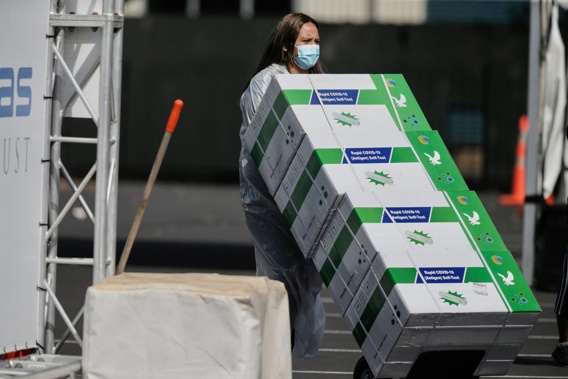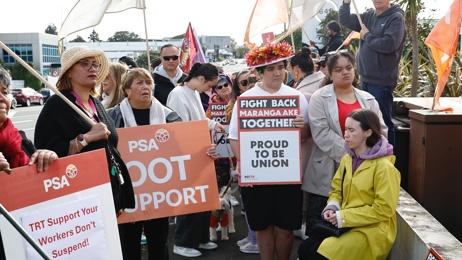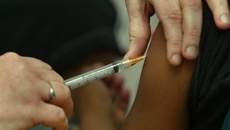
Those wanting to get their hands on a new Covid drug aimed at those who are higher risk of getting Covid will need a doctor's visit and have to meet strict criteria.
Doctors can start prescribing Paxlovid from next week, but the criteria for the pill is aimed at those more likely to get sicker from Covid such as those who are immunocompromised or had things like chronic respiratory conditions and diabetes.
Paxlovid is the first of two approved oral antiviral treatments of Covid-19 to have arrived in New Zealand.
Health Minister Andrew Little told RNZ there was a reasonably strict prescription criteria for Paxlovid.
A doctor would have to assess the patient first. It also needed to be taken within five days of acquiring the virus or becoming symptomatic.
Unvaccinated people who met the criteria were also eligible for Paxlovid.
"We have a basic principle in the health system that we don't discriminate ... that includes people who have chosen not to be vaccinated."
While the Omicron outbreak appeared to be on the downwards curve, Little said it hadn't gone away.
"Covid hasn't gone, we should expect and prepare for different outbreaks and different variants and this is one way of preparing for that."
Pfizer country medical director for Australia and New Zealand Dr Krishan Thiru told RNZ Paxlovid was an important second line of defence for people who were particularly vulnerable should they get Covid-19.
Thiru said it was for people who had just been diagnosed with Covid-19 and hadn't deteriorated, but were at risk so could take the five-day course at home.
The clinical trial found that there was a 90 per cent reduction in people needing to be hospitalised or dying.
"The idea is it prevents you from progressing to that severe disease the prevents you from needing hospitalisation."
Fourteen Covid-related deaths were reported alongside 15,918 Covid-19 community cases yesterday as the Government announced a new service that aims to give hundreds of thousands of people in rural and remote areas better access to rapid antigen testing.
The 14 deaths reported yesterday included people who had died over the past six days. There were 817 people in hospital with Covid-19, including 24 in intensive care.
Covid-19 Response Minister Chris Hipkins said spikes in case numbers and the number of people passing away from Covid-19 were expected over the coming weeks.
"That series of peaks and troughs is not unexpected. One of the things that is really important to look at is the overall trend and the good news for New Zealand at the moment is the overall trend... is heading in a downward direction."
The seven-day rolling average of Covid-19 community cases has declined from 17,111 last Wednesday to 14,969 yesterday.
University of Canterbury professor Michael Plank said the latest figures indicated New Zealand had passed its peak nationally and in most large regions, however case numbers may continue to increase in smaller regions.
That was because the outbreak first took off in Auckland, then other main centres before spreading into the regions, he said.
"It's not exactly a uniform wave moving down the country. It's more... a series of ripples in a pond, the rock landed in Auckland and then there are a series of smaller rocks landing in Hamilton, Wellington, Christchurch, Dunedin and the ripples sort of spread out from those centres."
Nationally, hospitalisations also appeared to have peaked and were declining.
Deaths - which lagged even longer behind case numbers than hospitalisations - would likely stay at the current average for another week or two before tapering.
Associate Health Minister Dr Ayesha Verrall announced a new rural RATs service that aims to get more rapid Covid-19 tests into the hands of people around the country.
More than 95 per cent of the population could access RATs within a 20-minute drive but there were about 250,000 people who lived in remote, rural areas where access wasn't so easy, she said.
The scheme would pair up with the existing DHB initiatives to ensure RATs were accessible to people regardless of where they lived, she said.
Verrall used Whanganui DHB as an example, which has distributed RATs via jet boats up the river and stock trucks travelling around the region.
If there was not an existing initiative in the area, RATs would be sent via courier directly to the person's home.
Meanwhile, Hipkins said the number of Māori providers supplying RATs has increased from 400 to 1000 over the past month.
"Everyone should now be able to access a rapid antigen test when they need one."
As of yesterday, 53.9 per cent of children aged 5-11 had received their first dose of Covid-19 vaccine while 15.9 per cent had received two.
Hipkins was asked at yesterday's press conference about first dose vaccination rates for 5-11 year olds, which have stalled at around 50 per cent for a month.
On February 28, for example, 50.4 per cent for eligible children aged 5-11 had received their first dose.
He said there were a couple of factors at play.
"We expected the uptake to be slow amongst that age group. It got off to a hiss and a roar and then it slowed down and that was effectively what we were expecting to see."
There would be children who would have had Covid-19 and now needed to wait three months to get either their first or second dose, he said.
University of Auckland vaccinologist and associate professor Helen Petousis-Harris said other factors included access issues and parents or caregivers who did not see Covid-19 as enough of a risk while also not being confident in the vaccine.
She said there hadn't been a lot of attention on getting children vaccinated compared to the efforts of adult vaccination.
"To make a good decision, you need information from the right sources. That's the sort of stuff that goes into people's decision making.
"If people were worried enough about the infection, and had a lot more confidence in the utility of the vaccine, then they're more likely to get the vaccine."
Take your Radio, Podcasts and Music with you









